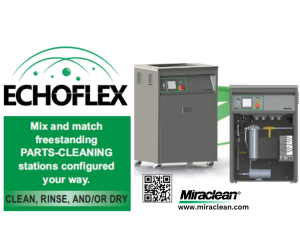Rinsing
In a dragout /rinsing process, is cold water effective or beneficial after a hot water rinse?
Q. In a dragout /rinsing process, is cold water effective or beneficial after a hot water rinse?—C.S.
A. Additional rises are almost always beneficial to remove the “contaminant,” whether it is residual cleaner, plating chemicals, etc. However, the final rinse is often the one that usually is reserved for the end of the line. This is because if you counterflow your rinse tanks, some of that heat will be picked up in the rinse tank it is flowing into. Additionally, heating the last tank can aid in the drying process, which is often necessary following most aqueous processing.
Related Content
-
Replacing Open-Top Vapor Degreasing in Aerospace Manufacturing
Options and considerations for cleaning aerospace parts as regulations tighten on vapor degreasing solvents.
-
Advantages to Pumped Eductor Agitation
Not all agitation methods are created equally. Pumped agitation with eductor nozzles can improve process tanks and quickly show a reduction in operating costs while keeping staff safe, following environmental legislation and preventing pollution.
-
Improving Wastewater Management Efficiency
Don’t find yourself underwater when managing wastewater processes. Follow these steps to improve efficiency and determine the best ROI.













